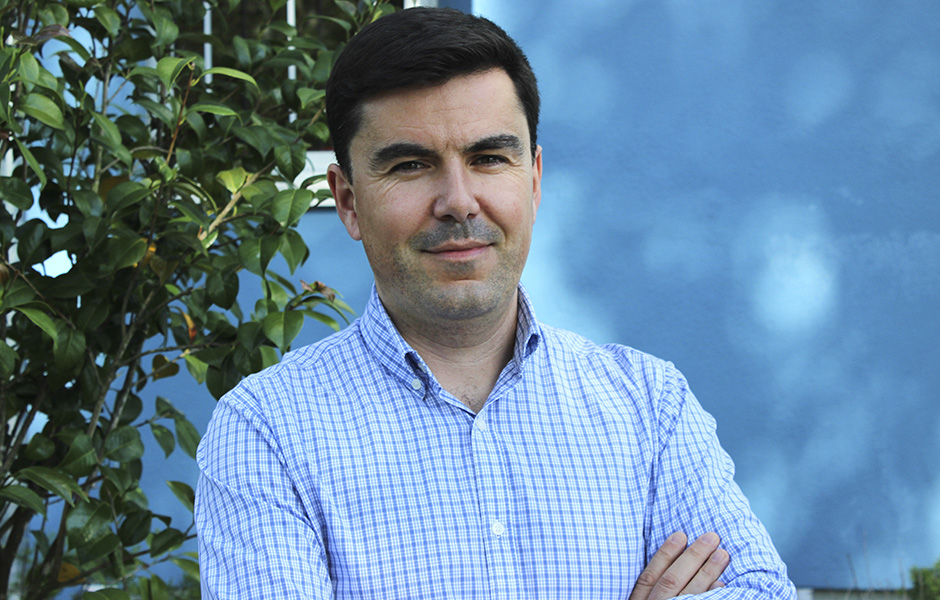Miguel Padilha is the principal investigator of Tech4edusim – Technologies for Education and Simulation in Healthcare, a new group of CINTESIS whose focus is on research and development of technology applied to education and the quality of health care. He was born 42 years ago. During childhood, he was a restless, rebellious kid. Already since his school years he used to receive “emergency calls” from classmates who were hurt while playing childhood and teenage-related games. He himself had his share of pains and hospital visits.
He wanted to be a pilot, but eventually he swapped planes for hospital wards and classrooms. Nursing only appeared as an option in the 12th year and much influenced by two great friends. He joined the current Nursing School of Porto (ESEP) in 1994, earning first his bachelor’s degree, and then the licentiate degree. He worked at the Cranioencephalic Traumatology Unit of the Hospital Santo António (currently part of the Hospital Center of Porto) until the end of 2003, when he began working as an assistant lecturer at ESEP, an appointment he accepted as a “moral obligation”. He has been an adjunct professor at ESEP since 2007.
The research formally entered his life in 2003, with the Master’s Degree in Nursing Sciences at ICBAS, in the field of self-management of disease. Since 2008, having earned a PhD in Nursing from the Catholic University, he has dedicated his studies to the respiratory area, particularly to the management of Chronic Obstructive Pulmonary Disease (COPD).
“Until very recently, we health professionals, as well as the general population, put a lot of emphasis on diagnosis and pharmacological treatment, but we did not care much about the skills people had to manage their disease. In today’s society, it is vital that patients have the skills to take decisions in their daily lives, such as knowing when to seek help, what is normal and what is not and how to use drugs correctly, which, in respiratory patients, is a central aspect”, he emphasizes.
According to Miguel Padilha, most patients misuse the devices. “I am still astonished. How can we invest so much money in drugs and not make sure that patients use them correctly? Often, patients do not comply with treatment because no one has taught them how to do that. This would be relatively easy to solve with low investment and it could bring faster and greater gains in health,” he says.
Education and health simulation are other areas in which he investigates, having participated in the development of a virtual clinical simulator for the education and skills training of future nurses, along with the enterprise Take the Wind.
Even though he joined CINTESIS as an integrated researcher of the NursID group, he recently, took the lead of a new research group within the unit, precisely in these areas, leading a multidisciplinary team that includes doctors, engineers, psychologists. “It was a challenge that I accepted naturally. We hope to build a common project that will enable research on simulation and health education technologies, which is absolutely central to the training of health professionals,” he says.
After making a diagnosis of the situation and establishing priority areas for action, the group plans to start working in 2019. “We are building the foundations for this group to last and contribute to improving the quality of health education,” he concludes.
What is your 1-Year Ambition?
In the immediate future, I want to implement the ECARE-COPD project – Promotion of Self-management of COPD, integrated by researchers from CINTESIS and for ESEP partnered with Take the Wind. Funded by Portugal 2020, the project focuses on the training of nurses to help patients self-manage the disease. It is, essentially, a training program of education dematerialization, based on an education perspective of the future, less school-centered and more focused on the student individual competence.
What is your 10-Year Ambition?
When this project is completed, a macro project of dematerialization of education and simulation begins. I also want to continue to dedicate my time to the management of COPD, which is a national priority in terms of public health. COPD affects 14.2% of the Portuguese population, but it is an underdiagnosed, under-treated and undervalued disease that continues to have a great impact on patients and the National Health System. We still need a lot of research and a different mentality to approach the problem.
How is life beyond research?
My family is my absolute priority – my two daughters, my wife, my mother and my parents-in-laws; although I cannot always give them the time I want.
I love running and cycling, always outdoors. I can stand being closed. Often, I just do not have enough time, but it is absolutely essential to maintain balance. This is also a time when I take many decisions and solve many problems because I can tune-out of everything.

